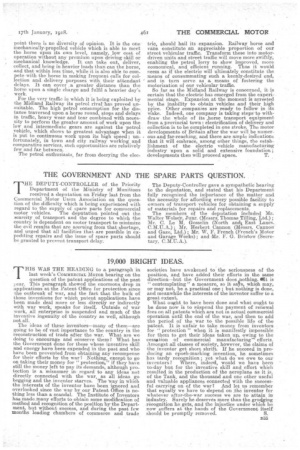19,000 BRIGHT IDEAS.
Page 13

If you've noticed an error in this article please click here to report it so we can fix it.
. HI8 WAS THE HEADING to a paragraph in last week's CommEnorm, MOTOR bearing on the question of the patent applications of the past year. This paragraph showed the enormous drop in applications at the Patent Office for protection since the outbreak of war, and the fact that the bulk of those inventions for which patent applications have been made deal more or less directly or indirectly with war work, speaks for itself. Outside of war work, all enterprise is suspended and much of the inventive ingenuity of the country as well, although not all.
The ideas of these inventors—many of them—are going to be of vast importance to the country in the reconstruction of trade after the war. What are we doing to encourage and conserve them'? What has the Government done for those whose inventive skill and energy have been expended in the past and who have been prevented from obtaining any recompense for their efforts by the war'? Nothing except to go
taking king their money for " protection, s' if they have still the money left to pay its demands, althougl protection is a misnomer in regard to any ideas not directly connected with the war, as all ideas go begging and the inventor starves. The 'way in which the interests of the inventor have been ignored and overlooked since the war by our Patent Office is nothing less than a scandal. The Institute of Inventors has made, many efforts to obtain some modification of method and recognition of the position by the Department, but without success, and during the past few months leading chambers of commerce and trade
societies have awakened to the seriousness of the position, and have added their efforts in the same direction—but the Government does ,.nothing. It is "contemplating" a measure, so it sils, which may, or may not, be a practical one; • but nothing is done, and meanwhile the interests of the inventor suffer to a great extent.
What ought to have been done and what ought to be done now is to suspend the payment of renewal fees on all patents which are not in actual commercial operation until the end of the war, and then to add the period of the war to the possible life of the patent. It is unfair to take money from inventors for " protection " when it is manifestly impossible for them to get their ideas taken up, owing to the cessation of commercial manufacturing' efforts. Amongst all classes of society, however, the claims of the inventor get short shrift. If he succeed in producing an epoeh-marking invention, he sometimes has tardy recognition ; yet what do we owe to our inventors ? Where,. indeed, would we have been to-day but for the inventive skill and effort which resulted in the production of the aeroplane as it is, of the Tank, and the thousand and one other useful and valuable appliances connected With the successful carrying on of the war? And let us remember that equally we have to depend on .the inventor for whatever after-the-war success we are to attain in industry. Surely he deserves more than the grudging recognition he gets, and the injustice under which he now suffers at, the hands of the Government itself should be promptly removed. S.
























